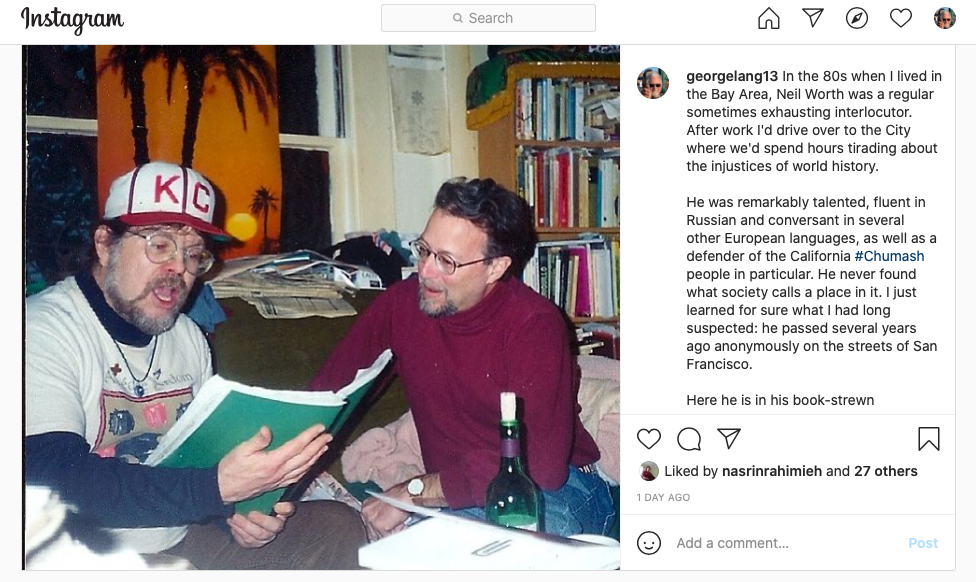Réponses à un questionnaire qui m’a été proposé par une jeune doctorante en France
*
Comment avez-vous rencontré Max Dorsinville ?
J’ai rencontré Max aux années soixante-dix à Montréal, où je vivais 1972-78, J’avais fait paraître un compte-rendu dans la Revue Canadienne de Littérature Comparée de son premier livre académique, Caliban without Prospero: Quebec and Black Literature. Aux annees soixantes, Max avait matriculé en littérature comparée à l’Université de Sherbrooke (Québec) et on partageait des amis qui avaient fait cette même école. Ils me l’ont présenté et on a lié amitié.
On se prenait tous les deux pour des débutants dans un nouveau domaine qui voyait alors jour, celui des litteratures dites du Tiers monde. Quinze ans plus tard, en 1989, j’ai fait encore une recension d’un de ses livres dans laquelle j’ai discuté l’importance de ce concept à ce moment maintenant révolu (https://www.jstor.org/stable/3819188?seq=1).
Est-ce en Haïti que vous avez, grâce à son entremise, rencontré Roger Dorsinville ? Sur quoi avez-vous travaillé avec lui ?
À ce moment, vers 1989, je ne savais pas qui était Roger Dorsinville, tout en l’ayant croisé en 1968 en Afrique. Mes propres recherches s’étaient dirigées vers les littératures en langues créoles (Entwisted Tongues: Comparative Creole Literatures), et vers cette fin j’avais entamé des brefs séjours de recherche en pays créolophones : le Cap vert, la Guyane et les Antilles françaises, Curaçao, parmi d’autres. Haïti naturellement figurait sur la liste de mes escales et Max, qui était sur le point d’assumer le rôle d’exécuteur littéraire de l’oeuvre de Roger, m’avait préparé une lettre d’introduction à Roger comme contact essentiel pour ma visite en Haïti.
Une fois sur place à Port-au-Prince, j’ai tout de suite contacté Roger qui m’a proposé un guide personnel et des rencontres avec des gens dans le monde littéraire, dont je n’ai pas profité pleinement, faute de temps et grâce à des difficultés pratiques.
J’ai décrit cette expérience dans “The Rule of François Duvalier in Two Novels by Roger Dorsinville”
(http://ile-en-ile.org/roger-dorsinville-preface/)
I was fortunate enough to meet Roger Dorsinville twice. The last time was in 1989 on the verandah of his home halfway up the hills above Port-au-Prince, symbolically sited, one might say, midway from the slums and Presidential Palace in the city itself, and the alarm-protected, air-conditioned, bougainvillea-breezed enclaves of Pétionville. He was already blind and ailing, but remembered in some detail the previous occasion we had met, anonymously on both sides. That was in 1968, at Cuttington College in upcountry Liberia, where he was serving as cultural attaché, and was the active proponent of the « tribal » cultures of the Americo-Liberian colony. He was in his prime, robust, articulate, generous, and just slightly mocking of the jejune academic I was. I had no idea he bore within the wounds of his idealistic past in Haiti, nor the seeds of his spiritual, literary self-healing. Two different qualities of light, both of which glow through the novels before you.
Pour préciser, j’avais passé 1967-1969 au Libéria dans un stage genre Peace Corps à l’époque où Roger y était. Puisque j’y enseignais le français — c’était au Cuttington College — je comptais parmi mes fréquences un certain Julien Lafontant, directeur de notre tout petit département de français (qui consistait de lui et moi). On avait l’habitude de prendre un cocktail ensemble pour causer un peu français et à une de ces occasions, “son vieil ami” Roger était à la maison dans la brousse de Libéria.
Julien a passé l’arme à gauche en 2013 après avoir fait carrière honorable aux EU (https://www.gracefuneralchapels.com/obituaries/Julien-Lafontant-9612/ /// https://unothegateway.com/uno-prof-lafontant-not-afraid-to-speak-his-mind/).
Ils était tous les deux de grands hommes, mais aussi des hommes grands. Ils s’étaient connus pendant leur jeunesse, possiblement au service millitaire, et moi, à l’âge de 23, quelque peu intimidé, j’ai retenu dans ma mémoire leur co-présence amicale, pleine de reparties, méme un tantinet moqueuse, sans savoir l’avenir littéraire de Roger, ni le mien.
En 1989, sur son verandah en Haïti, j’ai rappelé l’occasion à Roger, un peu tentativement car je n’étais pas certain de l’avoir bien placé. Lui était quasiment aveugle, mais, après quelques instants en fouillant dans son mémoire, il m’a fixé de ses yeux glauques et m’a rassuré : “je vous voie bien, vous êtes le petit blanc de chez Julien”
Cela dit, étant donné son état physique affailbli et le fait que je m’intéressais surtout au Kreyòl, notre contact était surtout social. Ce n’est que en 1992 que j’ai découvert les oeuvres romanesques de Roger, toujours à partir du projet de Max.
Savez-vous ce qu’il est advenu des archives personnelles de Roger Dorsinville, que Jean-Jacques Mandel avait fait rapatrier en Haïti pour lui ?
Malheureusement, je n’ai aucune idée. Il se peut que la veuve de Max, Marielle Dorsinville, y connaisse quelque chose. Je n’ai pas d’adresse pour elle mais je tâche de la retrouver par l’intermédiaire des amis à Montréal.
Notes
Primer of Haitian Literature in Kreyòl. Research in African Literatures, 35.2, pp.128-140.
Review of Solidarités: Tiers-monde et littérature comparée, Max Dorsinville. Research in African Literatures, 20.3, pp. 526-28. https://www.jstor.org/stable/3819188?seq=1
Preface to The Rule of François (“Papa Doc”) Duvalier in Two Novels by Roger Dorsinville: Realism and Magic Realism in Haiti. Max Dorsinville. Lewiston, N.Y.: Mellen Press, pp. v-viii. http://ile-en-ile.org/roger-dorsinville-preface/#r1′
Islands, Enclaves, Continua: Notes toward a Comparative History of Caribbean Creole Literature. In History of Literatures in the Caribbean, A. James Arnold, ed. Amsterdam: John Benjamins, pp. 29-56.
Two-Faced Literatures: A Caribbean Creole Dilemma. In Latin America as Its Literature, M.E. de Valdés, M. Valdés, R.A. Young, eds. Council on National Literatures World Report Vol. VIII. Whitestone, N.Y.: Council on National Literatures, pp. 188-201.
Remembering Roger Dorsinville. Research in African Literatures, 25.3 (Fall), pp. 171-175 [collaboration with Max Dorsinville, and translation]. https://www.jstor.org/stable/3819853?seq=1
Literary Aspects of Creole Bibles, with Particular Reference to the Haitian Bib la. In Semper Aliquid Novi: Mélanges offerts à Albert Gérard, Littérature Comparée et Littératures d’Afrique, Alain Ricard et János Riesz, eds. Tübingen: Gunter Narr Verlag, pp. 123-130.
La Fontaine Transmogrified: Creole Proverbs and the Cric? Cric! of Georges Sylvain. The French Review, 63.4, pp. 679-693.
Review of Pays natal, Max Dorsinville. Canadian Review of Comparative Literature, 14.2, pp. 326-329.
Review of Caliban Without Prospero, Max Dorsinville. Canadian Review of Comparative Literature, 2.3, pp. 289-94.

